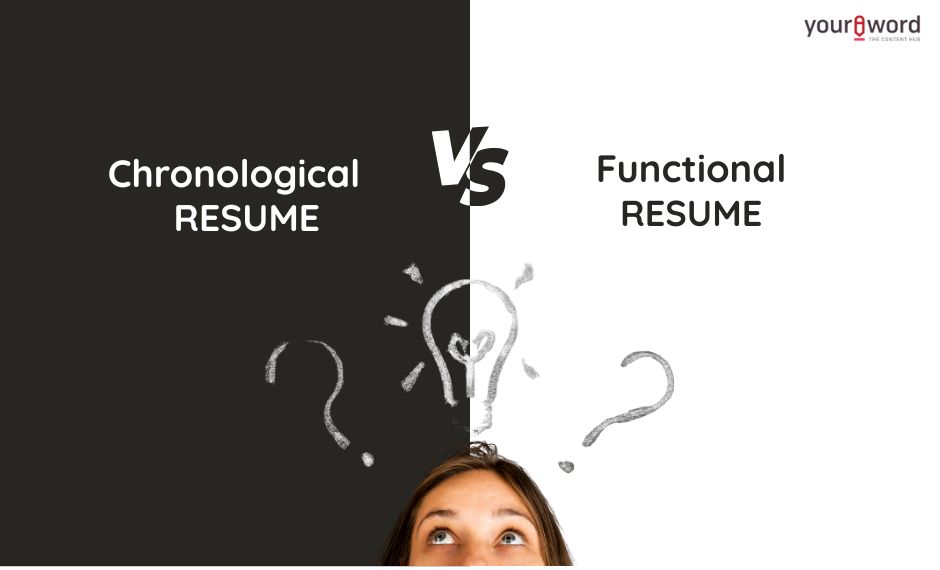Chronological vs. Functional Resume: Which Resume Format Works Best for You?

As individuals, we face different phases in life, and one such phase is our career. For job hunters, structuring a perfect resume is a challenge; many individuals face this dilemma when it comes to interviews and job seeking. Resume is very crucial because it decides, to a great extent, whether you will be shortlisted or not. Structuring and converting your life experiences and career jouney into different segments that aid the readers in easily summarizing your career path and deciding if you are the perfect fit for the role.
When it comes to resumes, there are many kinds to express yourself. Basically, in this blog, we will be discussing the chronological and functional types. This blog will guide you on how to format them and what works best for you. Both types have their own advantages, but works depending on other factors also. Let's break down and clarify it. YourWord is one of the leading CV writing services in Kerala.
What is a Chronological Resume?
From the name itself, we could understand that it is a type where the resume is structured in chronological order, listing the achievements and career experiences in reverse chronological order.
The key features of a chronological resume are:
- It gives importance to career experiences, focuses on the progression and achievement.
- The name of the company, date of employment, and years of experience.
- Highlights achievements within each role.
When to use it:
This format works best if you have a steady career, as it shows clearly what you were doing each year. The recruiters will have a clear idea of whether your experiences are relevant to the job posts you are applying for. If you are someone who has not had any career breaks, then this chronological resume will be the best way to showcase your achievements and the career path you have followed throughout.
What are the strategic advantages of a chronological resume?
Preferred by Managers: It is easy to navigate with a brief resume. The managers will be impressed at first glance by the whole history. Its standard layout makes it easy for them to quickly scan your career path.
Progression chart: The applicant's growth can be easily tracked. This shows slow and steady progress. This is very attractive to employers looking for consistent, high-quality candidates.
Experience: A chronological resume highlights stability and experience. A strong, continuous employment history with reputable organizations demonstrates your dependability and sustained dedication to your industry, which instantly boosts your credibility.
What are the disadvantages of a chronological resume?
Points unemployment: If there is unemployment for the individual, this format can easily point it out, leading to making it an obvious question for the interviewer.
- Job-Hopping: A history of changing jobs too frequently is very prevalent in the resume, making it a confusing and doubtful state for the recruiter regarding job-hopping. It gives the impression that you are not stable and consistent.
- Less Ideal for Career Changers: It can be challenging for those changing industries, as it prioritizes past job titles over transferable skills, making it harder to show relevance to a new field.
- Can Undersell Skills: For entry-level candidates or those with limited experience, this format can emphasize a short work history rather than the relevant skills and potential you possess.
What is a Functional resume?
The functional resume, compared to the chronological resume, focuses on skills. The other resume focuses on the years and the listings you have been doing to date. A functional resume is about the skills you are advanced in. For example, “logistics manager”, “client coordinator”, and “Project manager”.
The key features of a functional resume are:
- Focus on the skills and job titles rather than the years and places.
- It also gives the importance of group accomplishments
- Downplays gaps in employment or career changes.
When to use a functional resume?
This format is ideal to apply when you have a career break in your history. It allows you to showcase the skills you have to accomplish tasks easily, as the recruiters would see that you have grown professionally. It shows that your skills are effective and transferable.
What are the advantages of a Functional Resume?
- Focus on abilities: It easily shifts the focus to abilities. This format helps to highlight the relevant skills and tactics required for the job title applied for.
- Easily navigates career breaks: This style highlights what you can do over when you did it, regardless of whether you're changing careers, going back to work, or have gaps in your past.
- Showcase the skills exclusively: Rather than qualities, the group accomplishments allow you to do the skills explicitly, making it ideal for proving your value in the industry and working space.
What are the disadvantages of a functional Resume?
Reduces the impression: some of the recruiters find the career break or employment gaps as a lack of experience or a mark as a demark
It can be harder to follow: Recruiters who used to scanning the resume sometimes it creates a sense of confusion, where they will be either shortlisted or eliminated instantly.
Struggle with ATS software: Many applicant tracking systems are designed for chronological resumes, so a poorly formatted functional resume might not be processed correctly, resulting in automatic rejection.
Your resume is your story, and the right format can make all the difference. If you’re unsure which approach works best for you, don’t worry, reach out to us, and we’ll craft a resume that gets you noticed. Yourword is the best agency providing Resume Writing Services in Kerala. please contact us for further queries.
What We Offer
Web Content Development
SEO Based
Content Writing
Brand Identity Creation
Translation services
Content Marketing
Let’s talk about how
Your Word can help you.
Copyright ©2022 Your Word. All Rights Reserved. Developed by 

